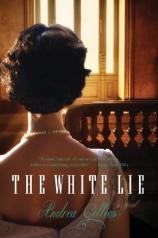Excerpt
Excerpt
The White Lie

One
•
2008
My name is Michael Salter, and I am dead; dead, that much I know for sure. All the rest of it – all of that I can only speculate about. I’ve had a lot of time to wonder about it: what I’m doing here and what it means, though thinking takes me round in circles, like Pooh Bear hunting the heffalump in the snow and realising he’s been following his own footprints.
My mother Ottilie was here earlier, in the wood, talking to me about misapprehensions and about guilt. She comes at least once a week and always on Sundays, from her cottage out at the coast, and she comes alone. Lately she’s been here almost every day and I’ve begun to act like somebody in hospital, alert at visiting hour for signs. I was watching as she came along the path this afternoon, a procession of one, slow-moving and stately in black. She came first to my memorial stone.
“Michael.” She spoke as if I were close by. “Today’s the day. We think today will be the day.”
I can’t remember seeing my mother ever wearing black before, but it’s the 14th anniversary of my disappearance here and … the truth is this hasn’t been any ordinary anniversary. She was unusually restless, walking along the beach, up and down, pausing at the furthest corners of the shore and struggling at moments with the depth of the grit.
“It won’t be long now,” she said, looking out over the water which stretches almost to the horizon; a vast bowl of it, many fathoms deep. The domesticated green summits we see around us here are in reality only the tops of submerged mountains: that’s what my grandfather used to say to me, when I was a child. They say in the village that the loch has moods, that when the wind blows it isn’t only the waves that rise and surge; that when it’s a dark, dark brown it’s at its most dangerous; that when the surface becomes a mirror it will reflect your profoundest wants back at you. It’s been viscous as mercury today, resembling something poured and inert, as if a silver skin has cooled on it.
Are you a ghost if nobody sees you, or are you something else? Ghost or not, I seem to have taken up residence in the grounds of the house where I was born, in the small wood planted here beside the loch in 1916. Not that I remember the moment exactly of arriving. Like the journey down the birth canal, some recollections are spared us. Too many, in fact. Memory reaches back, pausing at birthdays, Christmas mornings, the big conversations, key moments when we look into the eyes of our mother and know her in a new way; all the things that make impact on our little souls: the first bicycle, the first nightmarish week at the high school, the first proper kiss, the first cigarette and throwing up afterwards. I’m trying to get back to the earliest thing. I remember playing in the gardens at about the age of four, running along the sides of high topiary hedges. But for weeks and months that I know I was alive, there’s nothing, worse than nothing; indistinct traces left behind of something that’s gone.
My mother sat herself down, sitting up straight-backed in her usual way, in a dress that reached almost to her ankle, a black scarf twisted into use as a hairband, her fringe flattened over her eyebrows. She rubbed gently at her shins and said, “Arthritis, apparently. I’m beginning to be old.” Her thick and wavy hair, glorious once, a pinkish-gold colour, strawberry blonde, is filling with nylon-like grey. When she was young she wore it very long, flying behind her like a cape, but it’s shorter now, and worn up, fixed by what look like chopsticks. At 52 she’s beautiful still, or at least I think so, despite the creases around her eyes and the sad marionette lines around her mouth, but she’s aged visibly since this time last year, when a gathering to celebrate a birthday was interrupted by startling news, news of me that certain of them had kept to themselves. I’m going to tell you about that, about my grandmother Edith’s party and what happened afterwards. There have been sad consequences, introducing a new era. Not that catastrophe is anything new. The family has had more than an average share of disasters, of premature deaths, one generation after another, such that people refer quite routinely to the power of the Salter curse.
We’ve been going through a phase in which my mother is angry with me, though her visits take a circular shape, starting and ending with kindness. “You were such an idiot,” she said to me today. “How could a clever person be so stupid? Why, Michael, why did you put yourself in that position?”
Her left hand wiped long tears from her cheeks, the movement rapid, like someone hoping to keep their crying unnoticed. With her right hand she lifted and dropped handfuls of shingle, pausing to inspect each palmful as it fell, looking at crumbs of grey-green granite, white quartz and orange sandstone. She has a labourer’s hands, square with big flat nails on the ends of workmanlike fingers, residual paint lingering in the creases, her skin rough and red from cleaning and turpentine.
The sky was low and lilac-brown this afternoon, the sunlight streaming in fat columns from gaps in the cloud cover, like street lamps, pulsing its energy down. When Ottilie turned to face my way it was as if she looked right at me, though really she was looking back towards the house. Only the uppermost part of it is visible from here, through the trees, above and beyond the lime walk – a glimpse of turret, of crenellation, of the complex slate geometries of a swooping roofline: some French influence got mixed in with the Scots Baronial. It reminds me of an illustration from a book of fairy tales that I had once, a book that had been my mother’s.
Peattie doesn’t have that same Sleeping Beauty’s castle look of being enshrouded in vegetation, though the gardens are thick with weed, the rhododendrons feral, the trees untamed, and in every direction elderflower and thorn have woven their grid.
•
The history of the Salters is coming to an end, and if it’s hard to be definite about the attributing of malaise, there isn’t any doubt that the beginnings reach back to 1970 and the loss of another boy, Ottilie’s little brother, my child-uncle Sebastian. I’ve seen it, the death of Sebastian, although it happened before I was born. I’ve grown used to them now, these cinematic visitations, but I’ll admit that they were deeply disconcerting at first. They started one day out of the blue: I began to have (to see) memories that are not mine, that couldn’t be, because they pre-date me; they’re seen from the vantage point of someone who wasn’t there, as if the estate has its own record, soaked in deep and only just beginning to show itself. Perhaps it’s merely a kind of evaporation, a process without a point, though it’s hard to make a case for that: these are particular things and out of date order.
My aunt Ursula’s arrival in the drawing room on the day I disappeared: that’s an event I’ve seen more than once. Alan’s and Ursula’s account of my death, Alan’s original version. In Alan’s old passport he’d written under “occupation” handyman-gardener, and then he’d added entrepreneur. He doesn’t live at Peattie any more, but really Alan was only ever the handyman-gardener’s son, a man without official status, semi-permanently temporary.



